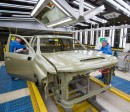For more than a year, the auto industry has been held hostage by the microchip shortage. Because of this, cars are built without critical components or lie rotting on parking lots, waiting for pesky pieces of silicon. Analysts see the situation improving for the first time in two years, although not by much.
According to research by Susquehanna Financial Group, the delivery times for semiconductors fell by a day in June. It’s not much, but it’s a sign that the situation might improve in the year’s second half, as many optimists expect. Lead times (the gap between when a semiconductor is ordered and when it is delivered) averaged 27 weeks last month, compared to 27.1 weeks in May. Before we cheer, we should know that the lead time was also 27 weeks in April.
“There are some signs of supply chain inflation easing and price increases slowing, but other pockets remain,” said Susquehanna analyst Chris Rolland in a research note cited by Automotive News. “Among key companies we track, none posted record-high LTs, perhaps another sign of ‘peak cycle.’”
It’s not all rosy, though, as some types of microchips have better prospects than others. The most significant decline in delivery times is registered for microcontroller units, or MCUs, as well as power management and memory chips. These are the most important chips for the car industry. Other microchips, like the field-programmable gate arrays, or FPGA, are still in short supply, with delivery times of more than a year. FPGA shortages affect mainly networking, optical, and telecommunications gear.
Citibank analysts cited by Automotive News forecast that semiconductor sales will rise 13% for 2022. This should bring a ray of sunshine into carmakers’ yards, although it’s still too soon to be optimistic. The same analysts also cautioned about different kinds of problems that might affect the chip industry. More specifically, people buy fewer personal computers and smartphones, and a recession is looming.
“There are some signs of supply chain inflation easing and price increases slowing, but other pockets remain,” said Susquehanna analyst Chris Rolland in a research note cited by Automotive News. “Among key companies we track, none posted record-high LTs, perhaps another sign of ‘peak cycle.’”
It’s not all rosy, though, as some types of microchips have better prospects than others. The most significant decline in delivery times is registered for microcontroller units, or MCUs, as well as power management and memory chips. These are the most important chips for the car industry. Other microchips, like the field-programmable gate arrays, or FPGA, are still in short supply, with delivery times of more than a year. FPGA shortages affect mainly networking, optical, and telecommunications gear.
Citibank analysts cited by Automotive News forecast that semiconductor sales will rise 13% for 2022. This should bring a ray of sunshine into carmakers’ yards, although it’s still too soon to be optimistic. The same analysts also cautioned about different kinds of problems that might affect the chip industry. More specifically, people buy fewer personal computers and smartphones, and a recession is looming.






